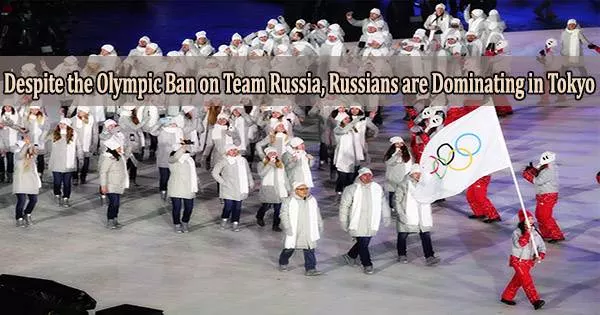There is a Russian elephant in the room at the Tokyo Olympics.
Because of its state-sponsored doping program, Russia is technically prohibited from participating in international sporting competitions until next year. Yet there are 334 publicly competing Russian gymnasts, sprinters, and other competitors in Tokyo.
They are accompanied by a small army of coaches, assistants, and other supporters who haven’t been averse to encouraging their team, despite the fact that the Japanese explicitly forbade cheering before they proclaimed a state of emergency and barred all spectators from the stands out of concern that it might spread Covid-19.
In fact, as of Wednesday, the Russian athletes had won 52 medals putting them in third place after China and the United States, according to the latest Olympic medals tally.
That they are able to continue adding to Moscow’s medal haul despite not being an official Russian team is due to an enormous loophole that enables them to compete as members of a made-up entity called ROC, which stands for the Russian Olympic Committee.
And that enrages detractors who claim the Russians received a light penalty from the International Olympic Committee because it was too terrified to impose a sentence appropriate to their crime.
“Back in the days of East Germany, they doped their athletes in every sport except sailing, then known as yachting,” David Wallechinsky, former president of the International Society of Olympic Historians, told NBC News. “The Russians went beyond that: they doped sailors and curlers, of all things.”
“It was so extensive, it was outrageous,” he said. “When the story came out, it was an enormous scandal and I personally felt that they just should have banned Russia from the Olympics for four years period.”
Instead, the IOC imposed a penalty that was “so weak and wimpy that it was painful.”
“Now you have a situation right here, right now, where the Russians feel, you know, ‘OK, we got away with it. Yeah, some of our athletes went down but we got a bunch more,’” Wallechinsky said. “And frankly, we could do it again and sacrifice more athletes.”
Travis Tygart, chief executive of the U.S. Anti-Doping Agency, called the IOC penalties on the Russians “a farce.”
“Unfortunately, we’ve seen this horror film already where the Russian state-sponsored doping program walks free and Russia wins while the IOC and WADA leaders attempt to pull the wool over the world’s eyes by claiming Russia is ‘banned’,” Tygart said, referring to the World Anti-Doping Agency, in an email to Reuters that was published Saturday. “It is barely a ‘rebrand’ and will do nothing to stop the corruption in Russia and likely will embolden others willing to win by any means.”
NBC News has reached out to ROC spokesman Konstantin Vybornov. So far, there has been no reply.
The IOC responded with a statement that did not address whether the Russians were being allowed to escape serious punishment, and insisted “the fight against doping and the protection of clean athletes are top priorities for the IOC.”
IOC spokesman Mark Adams has already been on the receiving end of questions from reporters about why the ROC athletes are routinely being referred to as “Russians” by Olympic officials (they’re not supposed to be) and whether the IOC will take steps to de-Russify the references to the ROC ahead of the Beijing Winter Olympics in February.
ROC athletes will be competing there because the ban on Russia is until Dec. 16, 2022.
“In certain circumstances, we can say ‘Russia Olympic Committee’,” Adams insisted during a press conference last week.
After being discovered running a state-sponsored doping scheme intended to increase its medal total at international sporting events, Russia was officially barred from participating in four years of international sporting events in 2019. The ban was later reduced to two years.
In Moscow, their athletes’ exploits have been front page news for weeks and they’re described as Russian athletes, not ROC athletes.
“Russian boxer Gadzhimagomedov reaches final in the Olympics and guarantees himself a silver,” was the headline for the top story in Kommersant, a leading Moscow daily newspaper Tuesday.
Written like a standard Olympics story, it ended with: “In the team rankings of the Tokyo Olympics, Russia ranks fifth after China, the U.S., Japan and Australia.”
No mention of the ROC.
So how does being banned from the Olympics look? For starters, ROC athletes can’t wave the Russian flag and their national anthem isn’t played during medal ceremonies.
The opening bars of Tchaikovsky’s Piano Concerto No. 1 have been played the dozen times a Russian has won a gold medal at these Games. And the flag they’ve waved is not the Russian flag, but it has an Olympic flame in Russia’s white, blue and red colors, with the Olympic rings beneath them.
The ROC athletes are not allowed to have the word Russia emblazoned on their uniforms, unless it’s accompanied by the words “neutral athlete.”
And that’s about it.
Wallechinsky said there is a reason why Russia is being treated with kid gloves by the IOC.
“The IOC just took the position, I believe, that there are certain countries that are just too important to the Olympic movement to eliminate, Russia being one of them, the United States being one, China being another. My guess, some of the Western European nations would also qualify,” he said.
Tygart insisted he was not painting all the ROC athletes with a broad brush.
“Of course, it is not fair to call into question any individual athlete’s performance, and all are presumed innocent unless and until proven otherwise,” he said.
But the circumstances under which the ROC athletes are competing have raised suspicions among some competitors.
After the U.S. swimmer Ryan Murphy finished second to the ROC swimmer Evgeny Rylov in the 200-meter backstroke Friday, he said, “It’s a huge mental drain on me … that I’m swimming in a race that’s probably not clean.”
“It frustrates me, but I have to swim the field that’s next to me,” he said.
Murphy did not name names and Rylov, who was sitting next to him during the press conference, tried to paper the remark over.
“I have always been for clean competition,” he said. “From the bottom of my heart, I am for clean sport. I’ve devoted my entire life to this sport. Ryan didn’t accuse me of anything, so I’d rather not comment.”
The ROC, however, was furious and blasted Murphy on its official Twitter account.
“You have to know how to lose,” it said in Russian. “But not everyone can. And here we go again the same old song about Russian doping is played by the old music box. Someone is diligently turning the handle. English propaganda is oozing verbal sweat onto the Tokyo Games. Through the mouths of athletes offended by defeats. We will not console you. We’ll forgive those who are weaker. God is their judge. He’s our helper.”
















